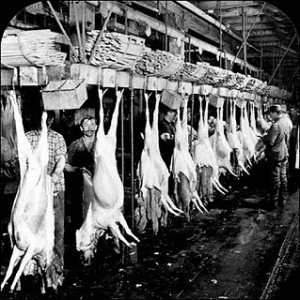In 1904, 26-year-old socialist Upton Sinclair was a struggling and impoverished New Jersey writer when he was commissioned by the editor of The Appeal to Reason – America’s most widely circulated socialist-populist newspaper – to write a fictionalised series on the exploited immigrant workers of Chicago’s meatpacking industry. Disguised as a worker, Sinclair gained access to the stockyards, slaughterhouses and meatpacking plants where he interviewed labourers and bore witness to the wretched conditions. Men, women and children worked in disgusting and unsanitary environments, with animal blood up to their knees. There were often no toilets; workers had to relieve themselves in the corners of the work floor. The hands of picklers and wool-pluckers were eaten away by acid. The thumbs of beef-trimmers were hacked down to lumps. Pay was pitiful, and corruption rife: workers were victims of blacklisting and kickbacks as bent foremen employed a small pool of better-paid and frequently alternated workers to “speed up the gang” by setting a furious pace for the rest of the plant. Seven weeks later, Sinclair returned to New Jersey to write his novel.
The Jungle is a propagandist tale of the fictitious Jurgis Rudkus and his family – Lithuanian immigrants inspired by real people Sinclair had met in Chicago – who are pulverised by dangerous, disgusting and low-paying work in a corrupt industry. As an afterthought, Sinclair included a chapter on how diseased, rotten and contaminated meat products were processed and mislabelled for sale to the public. In brutally graphic detail, he described how dead rats were shovelled into sausage-grinding machines; bribed inspectors would look the other way while diseased cows were slaughtered for beef; filth and guts were carefully swept up off the floor and packaged as “potted ham”; workers with tuberculosis coughed constantly – their bloody spit mingling with the blood of animals; meat for canning and making sausages was piled on the filthy floor before workers carried it off in rat-infested carts. And, unforgettably, the infamous “lard scene”:
“And as for the … men who worked in the tank rooms full of steam, and in some of which there were open vats near the level of the floor, their particular trouble was that they fell into the vats; and when they were fished out, there was never enough of them left to be worth exhibiting—sometimes they would be overlooked for days, till all but the bones of them had gone out to the world as Durham’s Pure Beef Lard!”
Following its serialisation in The Appeal To Reason, Doubleday published The Jungle as a book on 28th February 1906 to immediate and sensational international success. Within months it had been translated into 17 languages and had amassed an impressive list of vocal admirers including George Bernard Shaw, Bertolt Brecht, Eugene Debs, Winston Churchill and Jack London, who commented: “[What] Uncle Tom’s Cabin did for black slaves, The Jungle has a large chance to do for the wage-slaves of today.”
A zealous socialist, Sinclair certainly intended to expose “the inferno of [the workers’] exploitation.” But the plight of the labourer prompted little controversy compared to that one explicit chapter exposing the horrors of contaminated meat. Americans were horrified to discover what they had been eating, and food safety became a national obsession – no book published in the United States had ever generated such a loud outcry. Outraged consumers bombarded their senators and representatives for change. Upton Sinclair was even summoned to the White House by Theodore Roosevelt to verify his story, after which the president ordered an investigation of the Chicago slaughterhouses. Inspired by The Jungle, demand for reform was so fervent that, before the year was out, Congress was forced to pass the Meat Inspection and Pure Food and Drug acts – the first American laws to regulate the food industry.
For the highly politicised Sinclair, however, the outcome was one of bitter disappointment. The food safety reforms the government introduced so obsessed the U.S. public that his intended target of wage slavery became entirely forgotten. Sinclair would famously lament: “I aimed at the public’s heart, and by accident I hit it in the stomach.” But as the most enduring literary account of the Progressive Era, the grotesqueries contained within the pages of The Jungle continue to raise critical questions about a revolting industry that rears living creatures as commodities to be exploited for profit.
Over 100 years after the publication of Sinclair’s ‘muckraker’, the meat industry has degenerated into one of the most dangerous by-products of capitalism – responsible for untold global environmental destruction, resource depletion, institutionalised animal cruelty and human health risks.



5 Responses to 28th February 1906 – The Publication of Upton Sinclair’s “The Jungle”